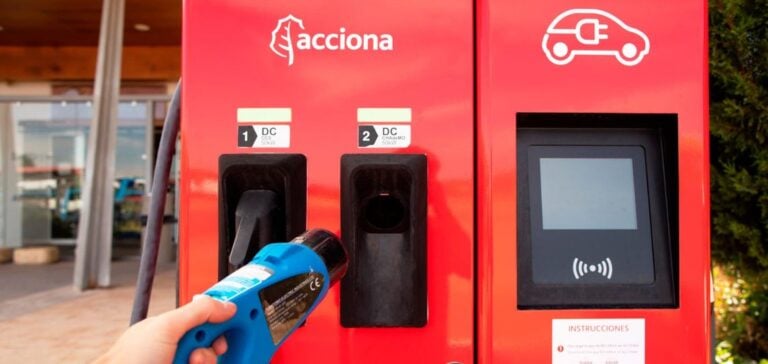ACCIONA Energía has recently signed agreements with various retailers, including restaurants, shopping centers and hotels, to install 1,000 new public charging stations across Spain. This initiative aims to support the transition to more sustainable mobility by increasing access to charging infrastructure for electric vehicles (EVs), as advocated by the European Union.
This new charging infrastructure, operational by 2025, will be integrated into the company’s current offering, bringing the total number of charging points to over 4,000, spread over urban and interurban roads.
Strategic Partnerships and Deployment
ACCIONA Energía has established a number of partnerships for the deployment of these kiosks, both with public bodies such as the municipalities of Collado-Villalba (Madrid), Campdevánol (Girona) and Onda (Castellón), and with private companies such as IKEA and Unibail-Rodamco-Westfield, aiming to install hundreds of kiosks in their stores and shopping centers.
In addition, the company is currently installing Madrid’s largest on-street electric charging station, demonstrating its ongoing commitment to the expansion of charging infrastructures.
Environmental impact and Technical specifications
The new charging stations will supply over 40GWh of 100% renewable energy per year for electric mobility, avoiding the emission of over 14,000 tonnes of CO2 into the atmosphere. Terminal capacities will range from 22kW to 180kW, with more than 400 super-fast 100-120kW terminals enabling a vehicle’s battery to be recharged from 20% to 80% in just 25 minutes.
The kiosks will be installed in areas with high traffic density and close to additional services such as restaurants, shopping centers and hotels, offering a more complete and convenient experience for users.
Future deployment
ACCIONA Energía plans to expand its network of charging stations to a total of 25,000 public access points by 2030. This expansion will include both the company’s own terminals and those managed for third parties. This initiative aims to support the infrastructure needed for the growing adoption of electric vehicles.
Expanding the charging network is crucial to meeting the growing demand for charging infrastructure, helping to reduce CO2 emissions and promote the use of electric vehicles.






















